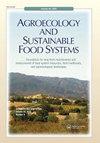“如果Pilcomayo河消失了,Weenhayek人也将消失”——玻利维亚南部渔业治理和土著制度多样性
IF 2.6
3区 农林科学
Q1 AGRICULTURE, MULTIDISCIPLINARY
引用次数: 0
摘要
理解制度多样性对于认识农村社区及其制度进程是其能动性和自主性的基础至关重要。这些缺陷阻碍了农业项目的充分实施和集体权利的实现。因此,本文分析了玻利维亚南部Weenhayek人的制度多样性及其对Pilcomayo河渔业的治理。维恩哈耶克人有捕鱼的身份,创造了水生食物系统和河流文化。我们进行了文献分析(20)、参与性观察和访谈(13)。我们的研究结果表明,Weenhayek的土著治理体系在其领土上并不均匀。社会生态边界的“模糊性”显示了正式制度边界的脆弱性。这表明,在支持可持续粮食系统和粮食主权方面,解决正式计划之外的机构问题的观点非常重要。图形抽象本文章由计算机程序翻译,如有差异,请以英文原文为准。
“If the Pilcomayo River is lost, the Weenhayek people will be lost” – governance of fisheries and indigenous institutional diversity in southern Bolivia
ABSTRACT Understanding institutional diversity is crucial for the recognition of rural communities and their institutional processes as fundamental to their agency and autonomy. Deficiencies hinder the adequate implementation of agricultural projects and the achievement of collective rights. Thus, this article analyses the institutional diversity of the Weenhayek people in southern Bolivia and their governance of fishing on the Pilcomayo River. Weenhayeks have a fishing identity, creating aquatic food systems and a riverine culture. We undertake document analysis (20), participant observation, and interviews (13). Our results reveal that the Weenhayek’s indigenous governance system is not homogeneous throughout their territory. The “fuzziness” of the socio-ecological boundaries shows the fragility of the formal institutional boundaries. This indicates the importance of perspectives that addresses institutions beyond formal schemes, to support sustainable food systems and food sovereignty. GRAPHICAL ABSTRACT
求助全文
通过发布文献求助,成功后即可免费获取论文全文。
去求助
来源期刊

Agroecology and Sustainable Food Systems
AGRICULTURE, MULTIDISCIPLINARY-GREEN & SUSTAINABLE SCIENCE & TECHNOLOGY
CiteScore
4.80
自引率
7.70%
发文量
73
期刊介绍:
Agroecology and Sustainable Food Systems is devoted to the rapidly emerging fields of agroecology and food system sustainability. By linking scientific inquiry and productive practice with transformative social action, agroecology provides a foundation for developing the alternative food systems of the future. The journal focuses on the changes that need to occur in the design and management of our food systems in order to balance natural resource use and environmental protection with the needs of production, economic viability, food security, and the social well-being of all people.
Agroecology and Sustainable Food Systems examines our current food systems from production to consumption, and the urgent need to transition to long-term sustainability. The journal promotes the study and application of agroecology for developing alternatives to the complex problems of resource depletion, environmental degradation, a narrowing of agrobiodiversity, continued world hunger, consolidation and industrialization of the food system, climate change, and the loss of farm land. The journal uses a food systems approach, and seeks experiences in agroecology that are on-farm, participatory, change-oriented, and backed by broad-based methodologies of sustainability analysis and evaluation.
 求助内容:
求助内容: 应助结果提醒方式:
应助结果提醒方式:


